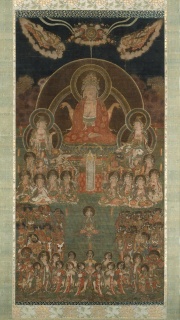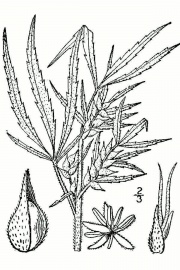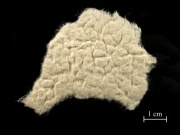Hemp
Description
A general name given to any of several coarse, durable bast fibers obtained from a variety of plants, e.g., Hibiscus cannabinus (Deccan hemp, Kenaf), Musa textilis (Manila hemp- see Abaca) or Agave sisalana (Sisal hemp- see Sisal). Indian hemp (Cannabis sativa), also called true hemp, is an ancient crop cultivated in Asia for its fibers as early as 2800 BCE. Hemp fibers range from 1-2 meters long and are yellow to brown in color. They have a high Cellulose content with little Lignin. Hemp is lustrous, strong and durable with good resistance to Water, salts, light, and insects. Hemp is used for cordage, fish lines, Sailcloth, Canvas, and Burlap.
- For hemp fiber identification, see http://cameo.mfa.org/wiki/Category:FRIL:_Hemp
Synonyms and Related Terms
Indian hemp; marijuana; ganja; chanvre (Fr.); Hibiscus cannabinus (Deccan hemp); Musa textilis (Manila hemp); Agave sisalana (Sisal hemp); Cannabis sativa (Indian hemp, true hemp, or marijuana); almindelig Hamp (Dan.); Hanf (Deut.); chanvre (Fr.); hennep (Ned.) cânhamo (Port.); hampan (Sven.); cáñamo (Esp.)
Risks
Combustible, may ignite spontaneously when wet.
Physical and Chemical Properties
- Resistant to water and alkalis. Damage by weak acids and bleaches.
- Fiber length = 1-2 m; Fiber width = 9-40 microns
- Thermal conductivity = 0.040 W/m.K Thermal resistance = 2.35 at 2.50 m°C/W.
Paper fiber type: non-woody/bast. Using transmitted light microscopy, fibers are identified by long fibers with dislocations, cross-markings and longitudinal striations. Fibers are wider than those of flax. Unlike flax, the lumen is wide and flat. Appearance with Graff "C" stain: red when bleached. Average dimensions of fibers: length 25mm, width 25μm. Common pulping method: pulp is wretted, treated with lime, followed by the soda process.
Comparisons
Additional Images
Resources and Citations
- Richard S. Lewis, Hawley's Condensed Chemical Dictionary, Van Nostrand Reinhold, New York, 10th ed., 1993
- Hoechst Celanese Corporation, Dictionary of Fiber & Textile Technology (older version called Man-made Fiber and Textile Dictionary, 1965), Hoechst Celanese Corporation, Charlotte NC, 1990
- J.Gordon Cook, Handbook of Textile Fibres:I Natural Fibres, Merrow Publishing Co. , Durham, England, 1984
- Encyclopedia Britannica, http://www.britannica.com Comment: "hemp" [Accessed January 3, 2003].
- Wikipedia: http://en.wikipedia.org/wiki/Hemp (Accessed Nov. 9, 2005)
- Ralph Mayer, A Dictionary of Art Terms and Techniques, Harper and Row Publishers, New York, 1969 (also 1945 printing)
- Identification of Textile Materials, The Textile Institute, Manchester, England, 1985
- The Dictionary of Art, Grove's Dictionaries Inc., New York, 1996
- G.S.Brady, Materials Handbook, McGraw-Hill Book Co., New York, 1971 Comment: p. 395
- Rosalie Rosso King, Textile Identification, Conservation, and Preservation, Noyes Publications, Park Ridge, NJ, 1985
- Matt Roberts, Don Etherington, Bookbinding and the Conservation of Books: a Dictionary of Descriptive Terminology, U.S. Government Printing Office, Washington DC, 1982
- Henry Hodges, Artifacts: An Introduction to Early Materials and Technology, Ronald P. Frye, Kingston, Canada, 1988
- Marjory L. Joseph, Introductory Textile Science, Holt, Rinehart and Winston, Fort Worth, TX, 1986
- Book and Paper Group, Paper Conservation Catalog, AIC, 1984, 1989
- Random House, Webster's Encyclopedic Unabridged Dictionary of the English Language, Grammercy Book, New York, 1997
- The American Heritage Dictionary or Encarta, via Microsoft Bookshelf 98, Microsoft Corp., 1998
- Art and Architecture Thesaurus Online, http://www.getty.edu/research/tools/vocabulary/aat/, J. Paul Getty Trust, Los Angeles, 2000
- Marja-Sisko Ilvessalo-Pfäffli. Fiber Atlas: Identification of Papermaking Fibers (Springer Series in Wood Science). Springer, 1995.
- Walter Rantanen. "Fiber ID Course." Integrated Paper Services. June 2013. Lecture.





